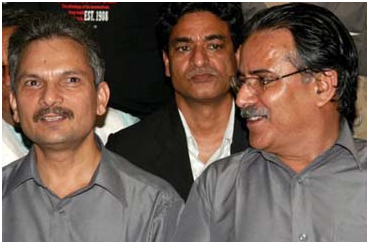Nepal Maoists to Launch 'Peaceful' Peoples war Again
Back to the Masses again!
NEW DELHI: Fed up of the opposition from the Nepali Congress and the “even more right wing” Communist Party of Nepal (Unified Marxist- Leninist) to the formulation of a Constitution empowering the poor, the Maoists have decided to go back to the people with mass programs.
This is a major shift in position and a final declaration that the Unified Communist Party of Nepal (Maoist) is finally giving up on its efforts to reach a compromise following an assessment that the peace process has been splintered beyond repair by the “bourgeois parties” along the way. And that while a compromise was possible, it could not be without federalism and electoral reforms as key ingredients. “We cannot betray the people and the 15,000 cadres who laid down their lives in the struggle,” Bhattarai said. He added, however, that the first preference was still a negotiated compromise but not “unilateralism” as was being tried by the NC and UML currently.
UCPN-M leader Baburam Bhattarai made it clear today that they had been left with no alternative but to go back to the people. Bhattarai is in Delhi to lobby support for his party’s position and has met the President of India Pranab Mukherjee as well as the Minister of External Affairs Sushma Swaraj along with others. He will be meeting the Opposition leaders as well.
It is no secret that the Maoists have been stymied at every step by the Nepali Congress and the CPN-UML working together to what the Maoists claim is a ‘conspiracy’ to block the smooth formulation of the new constitution. Significantly the ruling coalition has only just decided to ask the Constituent Assembly chair Subas Nembang to call a meeting, that had been kept in limbo for at least three weeks. Nembang had postponed the CA meeting on February 12 indefinitely, leading to the impasse that has compelled the Maoists to finalise a ‘back to the people’ strategy.
The first indication that the Maoists and Madhesis were turning away from the ruling coalition’s refusal to give in on the issues of governance and electoral reforms came on February 28 when their alliance of 30 opposition parties organised a mass rally in Kathmandu demonstrating their influence and reach. It might be recalled that the Maoists influence during the Peoples War that was waged in the 1990’s was widely perceived to be rural, until they laid siege to Kathmandu with popular support. This rally also demonstrated that the influence has not waned and has been factored into the decision to go back to the people, and gather support for their position again, through peaceful means.
Bhattarai was clear, in response to a question from The Citizen, that there was no question of an armed struggle now. He said that the Maoists had through the armed struggle achieved two of their main goals, the overthrow of the monarchy and the weakening of the feudal strings of power. He said that there was thus no need for picking up arms, and the mobilisation would now be peaceful to ensure that Nepal got a Constitution that empowered the poor. It will be a peaceful, democratic peoples mobilisation,” Bhattarai said emphasising that there was no need and hence no question of an armed struggle.
The campaign has begun with the recent mass rally. UCPN-M chair Pushpa Kamal Dahal aka Prachanda advised the UML to merge with the NC as “these two parties are no longer different from each other in terms of political agendas.” Bhattarai was equally clear that there is no difference between the two, and in fact the UML despite its fancy name was every more right wing than the Nepali Congress in its functioning. The Maoist leaders are clear that they while they have worked on an acceptable compromise for the past years, they will not give up on the fundamental issues of federalism, governance and electoral reforms. Bhattarai said these were crucial issues for the Maoists, as it was imperative to usher in proportional representation in a manner that the poor can be represented in the Constituent Assembly. He said that the NC and UML had gone back on this completely.
Bhattarai was clear that the Maoists had been cooperating all the way, and had compromised on many issues as it was the practical thing to do. But the party was not prepared to give up the crucial issues, and despite agreements the NC and UML “diehard alliance” was now resisting these. He said his party was still open to a compromise even though it was sure that this was no longer possible, and there was no alternative but to launch a peaceful peoples war for a government and a Constitution empowered by the poor and marginalised people of Nepal.
Interestingly, the Indian government has for the moment at least adopted a ‘hands off’ approach and is not interfering in the internal affairs of Nepal. Prime Minister Narendra Modi has supported the implementation of the earlier peace agreements, a stand that compliments the position taken by the Maoists and other political parties on the record at least, and there is no change in that so far. The United States, China and India have all left it to the Nepal parties to sort out the issues. This does not the lobbying of course with leaders of the different political parties in New Delhi every now and again to meet the political establishment, and urge support for their specific positions.





